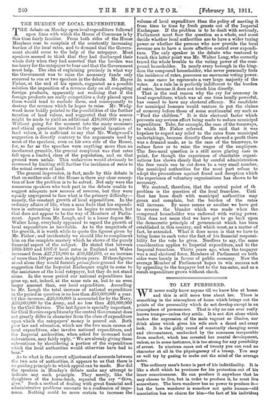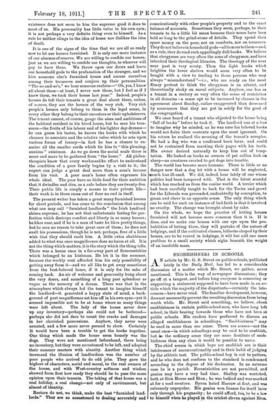TO LET FIJRNIS RED.
WE never really know anyone till we know him at home, and this is still more true about her. There is something in the atmosphere of home which brings out the points of the personality which do not develop except in an atmosphere of permanence. That is why no one ever really knows tramps—unless they settle. It is not dirt alone which makes the expression of the male vagrant so illusive, nor drink alone which gives his wife such a dazed and crazy look. It is the giddy round of constantly changing scene and circumstance, unchecked by the sameness inseparable from comfort, which has arrested her mental development, unless, as in some instances, it is too strong for any possibility of arrest. In nineteen cases out of twenty you can read no character at all in the physiognomy of a tramp. You may as well try by gazing to make out the mind of the average actor.
The ordinary man's home is part of his individuality. It is like a shell which he produces for his protection out of his inner consciousness. He can produce it anywhere that he may choose to live, but in order to produce it, he must live somewhere. The born-wanderer has no power to produce it—. but the born wanderer is somehow not quite human—old association-has no charm for him--the fact of his individual
existence does not seem to him the supreme good it does to most of us. His personality has little value in his own eyes; it is not perhaps a very definite thing even to himself. As a rule he neither clings to the idea of home nor dislikes the idea of death.
It is one of the signs of the time that we are all so ready now to let our houses furnished. It is only one more instance of our absence of reserve. We are willing to confide our homes, just as we are willing to confide our thoughts, to whoever will pay to have them. We throw open our doors and leave our household gods to the profanation of the stranger, and we hire someone else's furnished house and amuse ourselves among their treasures and conjure up their personalities. "The so-and-so's," we hear someone exclaim—" Oh, yes, I know all about them—at least, I never saw them, but I feel as if I knew them, we took their house last year." Indeed, people's houses do tell their tenants a great deal about them, unless, of course, they are the houses of the very rich. Very rich people's houses only belong to them in the legal sense, in every other they belong to their ancestors or their upholsterers. The tenant cannot, of course, gauge the aims and ambitions of the habitual resident in his hired house, but he sees his trea- sures—the fruits of his labour and of his lighter day-dreams- he can guess his tastes, he knows the books with which he chooses to associate and the relative value which he sets upon various forms of luxury—in fact he has a chance to ex- amine all the smaller cords which tie him to " this pleasing, anxious" existence. As we go down the social scale there is more and more to be gathered from " the home." All philan- thropists know that every workmanlike effort to understand the condition of a poor family begins by a visit to it; the expert can judge a great deal more than a man's income from his visit. A poor man's home often expresses his whole ideal. The poor have so little food for their ambition that it dwindles and dies, as a rule before they are twenty-five. Their public life is simply a means to their private life— their work is in three cases out of four no end in itself.
The present writer has taken a great many furnished houses for short periods, and has come to the conclusion that among what one may call " furnished landlords " the Irish landlord shines supreme ; he has not that unfortunate feeling for per- fection which destroys comfort and liberty in so many houses ; he likes ease, and if he is a man of taste be likes pretty things, but he sees no reason to take great care of them ; he does not exalt his possessions, though he is not, perhaps, free of a little wish that they should exalt him. A little extra shabbiness added to what was once magnificence does no harm at all. It is not the thing which matters, it is the story which the thing tells. There was a house once in a far-away part of Somersetshire which belonged to an Irishman. He let it in the summer, because the weekly rent afforded him his only possibility of getting away from it—and we all like to get away sometimes from the best-beloved home, if it is only for the sake of coming back. An air of welcome and generosity hung about the very doors, and something of a long past splendour as vague as the memory of a dream. There was that in the atmosphere which always led the tenant to imagine himself the landlord—it generated a happy state of mind, a back- ground of past magnificence set him off in his own eyes—yet it seemed impossible not to be at home where so many things were left about. The lady of the house never drew up any inventory—perhaps she could not be bothered— perhaps she did not dare to count the cracks and damages in her cherished possessions. Anyhow, they never were counted, and a few more never seemed to show. Certainly it would have been a trouble to get the books together. One thing which made the house seem homely was the dogs. They were not mentioned beforehand, there being no inventory, but they were accustomed to be left, and adopted their summer masters with alacrity. Another thing which increased the illusion of landlordism was the number of poor people who arrived to do odd jobs. They gave the highest of characters, social and moral, to the real owners of the house, and with West-country softness and wisdom showed from first bow ready they should be to pass the same opinion upon their tenants. The taking of that house was a real holiday, a real change—not only of environment, but almost of identity.
Rectors do not, we think, make the best "furnished land- lords." They are so accustomed to dealing accurately and
conscientiously with other people's property and to the exact balance of accounts. Sometimes they seem, perhaps, to their tenants to be a little bit mean because their noses have been held so long to the grind-stone of details. They spend their spare money on the poor, not on comforts, nor on treasures. They do not believe in household gods—all honour to them—and, as a rule, they do read such appallingly dull books. We believe that clergymen are very often the sons of clergymen, and have inherited their theological libraries. The theology of the near near past is very musty. Then the light books which brighten the lower shelves would seem very often to be bought with a view to lending to those persons who may always " misunderstand "—i.e., who are ready on the most flimsy pretext to think the clergyman is an atheist, and theoretically shaky on moral subjects. Anyhow, one has as a tenant in a rectory so very often the sense of restriction in all domains —a sense apt to be increased by clauses in the agreement about Sunday, rather exaggerated than decreased by assurances that they are put in solely for the good of the congregation.
We once heard of a tenant who objected to the house being "full of books" before he took it. The landlord was at a loss to imagine why he minded, as he was sure his beloved books would not foice their contents upon the most ignorant. On his return he realised the meaning of the tenant's scruples. He had a dog who was a confirmed book lover, and could not be restrained from marking their pages with his teeth. His owner desired naturally to keep him out of temp- tation. He looked on books as owners of pet collies look on sheep—as creatures created to get dogs into trouble.
The world has become more humane. There is little or no danger now that a dog let with a house will be neglected, uch less ill-used. We did, indeed, hear lately of one whose politics had been tampered with. That is the latest scandal which has reached us from the canine world. A terrier which had been carefully taught to bark for the Tories and growl for the Liberals was persuaded, undoubtedly by corruption, to groan and cheer in an opposite sense. The only thing which can be said for such an instance of bad faith is that it involved no cruelty. The change was brought about by cake.
On the whole, we hope the practice of letting houses furnished will not become more common than it is. If it does, and we make our homes with one eye upon the pro- babilities of letting them, they will partake of the nature of lodgings, and if the cultivated classes, hitherto shaped by their homes, are to be reared in lodgings, it will bat add one more problem to a small society which sighs beneath the weight of an insoluble mass.







































 Previous page
Previous page